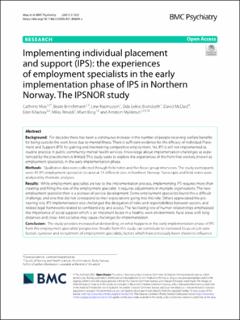| dc.contributor.author | Moe, Cathrine Fredriksen | |
| dc.contributor.author | Brinchmann, Beate | |
| dc.contributor.author | Rasmussen, Line | |
| dc.contributor.author | Brandseth, Oda Lekve | |
| dc.contributor.author | McDaid, David | |
| dc.contributor.author | Killackey, Eóin | |
| dc.contributor.author | Rinaldi, Miles | |
| dc.contributor.author | Borg, Marit | |
| dc.contributor.author | Mykletun, Arnstein | |
| dc.date.accessioned | 2022-07-31T17:32:42Z | |
| dc.date.available | 2022-07-31T17:32:42Z | |
| dc.date.created | 2021-12-20T19:07:55Z | |
| dc.date.issued | 2021 | |
| dc.identifier.citation | BMC Psychiatry. 2021, 21 1-13. | |
| dc.identifier.issn | 1471-244X | |
| dc.identifier.uri | https://hdl.handle.net/11250/3009295 | |
| dc.description.abstract | Background: For decades there has been a continuous increase in the number of people receiving welfare benefits for being outside the work force due to mental illness. There is sufficient evidence for the efficacy of Individual Place- ment and Support (IPS) for gaining and maintaining competitive employment. Yet, IPS is still not implemented as routine practice in public community mental health services. Knowledge about implementation challenges as expe- rienced by the practitioners is limited. This study seeks to explore the experiences of the front-line workers, known as employment specialists, in the early implementation phase. Methods: Qualitative data were collected through field notes and five focus group interviews. The study participants were 45 IPS employment specialists located at 14 different sites in Northern Norway. Transcripts and field notes were analysed by thematic analyses. Results: While employment specialists are key to the implementation process, implementing IPS requires more than creating and filling the role of the employment specialist. It requires adjustments in multiple organisations. The new employment specialist then is a pioneer of service development. Some employment specialists found this a difficult challenge, and one that did not correspond to their expectations going into this role. Others appreciated the pio- neering role. IPS implementation also challenged the delegation of roles and responsibilities between sectors, and related legal frameworks related to confidentiality and access. The facilitating role of human relationships emphasised the importance of social support which is an important factor in a healthy work environment. Rural areas with long distances and close- knit societies may cause challenges for implementation. Conclusion: The study provides increased understanding on what happens in the early implementation phase of IPS from the employment specialists’ perspective. Results from this study can contribute to increased focus on job satis- faction, turnover and recruitment of employment specialists, factors which have previously been shown to influence | |
| dc.language.iso | eng | |
| dc.title | Implementing individual placement and support (IPS): the experiences of employment specialists in the early implementation phase of IPS in Northern Norway. The IPSNOR study | |
| dc.type | Peer reviewed | |
| dc.type | Journal article | |
| dc.description.version | publishedVersion | |
| dc.description.version | publishedVersion | |
| dc.source.pagenumber | 1-13 | |
| dc.source.volume | 21 | |
| dc.source.journal | BMC Psychiatry | |
| dc.identifier.doi | 10.1186/s12888-021-03644-x | |
| dc.identifier.cristin | 1970759 | |
| dc.relation.project | Norges forskningsråd: 273665 | |
| cristin.ispublished | true | |
| cristin.fulltext | original | |
| cristin.fulltext | original | |
| cristin.qualitycode | 2 | |

